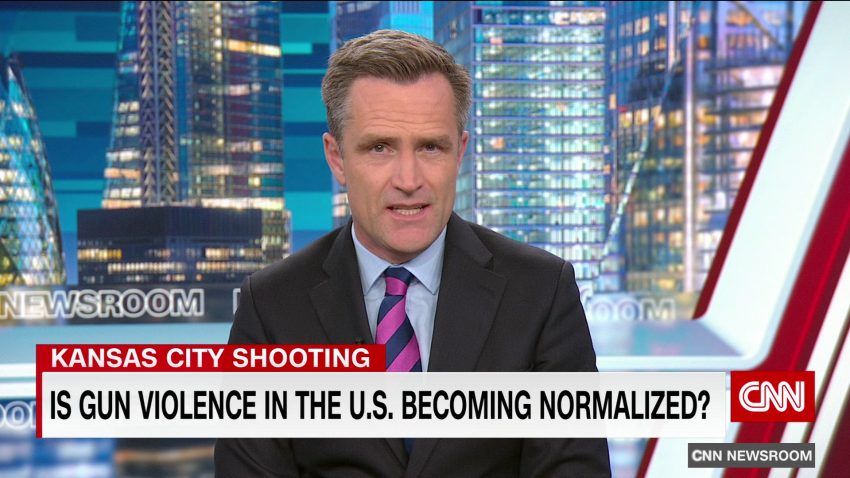Editor’s Note: Jill Filipovic is a journalist based in New York and author of the book “OK Boomer, Let’s Talk: How My Generation Got Left Behind.” Follow her on Twitter. The opinions expressed in this commentary are solely her own. View more opinion on CNN.
Again, a mass shooting has senselessly stolen people’s lives – eight victims, including three small children. Again, America is the only country on earth where this happens with such regularity. And again, the debate over how to stop mass shootings and quell endemic gun violence more broadly has devolved into a partisan stalemate.

This pattern is particularly grotesque because the question of how to radically reduce gun deaths is an answered one. There are reams of evidence that show just how nations the world over keep their citizens safe from the kind of everyday gun violence that terrorizes Americans.
The problem isn’t that this is some unsolvable mystery, it’s that one side of the debate simply doesn’t like the solutions that have been proven to work.
Take Megyn Kelly, the former Fox News anchor, who said on Twitter that she is “sick and tired of opening up the papers, or the phone, and the Twitter—whatever—and just seeing the entire aftermath get mired in the gun debate, which has lost. It’s over.” She continued: “We need to face reality, okay? The states that have the strictest gun laws—New York, California, Connecticut, where I am now—have had multiple mass shootings in this past decade. They don’t work any better than the states that have lenient gun laws like Texas.”
This is not true, and it’s a prime example of why conservative talking points on guns are so infuriating: they’re often misleading manipulations of the data, instead of principled defenses of an unpopular position.
In fact, states with lax gun laws have higher rates of mass shootings than those with stricter laws. And more restrictive gun laws are associated with less gun violence generally: mass shootings, but also homicides and suicides.
It is true that more liberal states also experience significant gun violence. But this is in large part because a far-right Supreme Court has radically reshaped American gun law, making it impossible for liberal states to implement the kinds of regulations that their voters want. And the US doesn’t have enforced borders between states, which means – for example – that when Indiana has loose gun laws, Chicago suffers higher rates of gun violence.
We know that the reason the US is a global outlier when it comes to gun deaths is because the US is a global outlier when it comes to our radically permissive gun laws, and as a result, we have a staggering number of guns in America. Other developed democracies also have people living with mental illnesses; other countries have criminals and violent men and abusive husbands and political radicals and people who attempt suicide.
But the US is the only developed democracy that has such a horrifyingly high rate of gun violence, from mass shootings to non-mass shootings to suicides by gun. The only nations that beat us are those embroiled in war, or embroiled in gang violence so endemic that they are essentially failed states.
The research on this question is thorough and it couldn’t be clearer: American gun violence is a result of loose American gun laws. And yet Americans, who generally support stricter gun laws, largely cannot get them because of a reactionary pro-gun minority that holds the rest of us hostage.
Even after the latest Texas shooting, an incredibly modest bill to raise the minimum age for purchasing a semiautomatic weapon from 18 to 21 is expected to stall out in the legislature. The fact that the bill is even making it to the floor is considered a win for those who support sensible gun laws. And yes, it is to the credit of phenomenal and tireless activists that this bill has advanced. But how pathetic that a bill to bar teenagers from buying weapons of war remains unlikely to ever become law.
Any debate on this issue has to start with the facts. People who oppose changing America’s gun laws, or loosening them further, are welcome to their own opinions. But they are not welcome to their own facts. And they should have to have this debate on the merits: Stricter gun laws would prevent many gun-related deaths; some nevertheless oppose stricter gun laws because they believe those laws impinge upon an individual freedom to own as many deadly weapons as one desires. The cost of loose gun laws is more gun deaths; those who oppose tightening gun laws should be honest and say that more gun deaths is a cost they are willing to bear for looser gun laws.
Taking a principled moral stance requires honesty, including about costs and downsides. For example, I hold a pretty expansive view of First Amendment free speech rights, and believe that they should only be abridged under the narrowest of circumstances. There are real costs to this position: It allows for the kind of hateful and bigoted speech that does real damage to people’s mental and even physical health. It allows for protesters to gather outside of health clinics in displays that I believe are among the most reprehensible non-criminal acts around. It allows for Nazis to march in public spaces. It allows for a lot of people to make my life occasionally miserable by attacking and harassing me online. I believe that the freedoms provided for by a liberal interpretation of First Amendment free speech provisions are fundamental and valuable enough that they justify these costs.
But I don’t deny that the costs exist, and that they could be lessened if speech were controlled more tightly: Stricter laws on hate speech, which are employed in Canada and Europe, penalize and ostensibly decrease hate speech. I will go to bat for liberal free speech laws nonetheless. But I’ll argue in the terms of reality and in line with the facts, not in denial of them.
Proponents of loose or nonexistent gun laws should do the same. One reason the gun debate in the US feels so stuck is that it’s not happening on shared terms. One side presents facts and data to support their policy positions; the other side disputes those facts without merit, and simply claims that the solutions that have worked in just about every other developed democracy on Earth don’t work and aren’t the answer here. This is not a sane or productive way to debate one of the most salient, life-or-death political issues around, and it’s not a recipe for any kind of solution.
Gun proponents need to be honest: If they believe that the costs of lax gun laws – endemic gun violence, mass death, guns as the leading killer of American children – are a worthwhile tradeoff for the vast right for just about anyone in America to own as many deadly weapons as they like with little regulation, that is their prerogative. This is America, after all, and everyone is entitled to their own opinion. But they should stand behind their principles, accept the facts and argue on the merits. And they may have to accept that their principles are not held by most Americans that most of us will choose life and safety over nearly unlimited rights to weaponry and the mass violence and death that come as a result.






